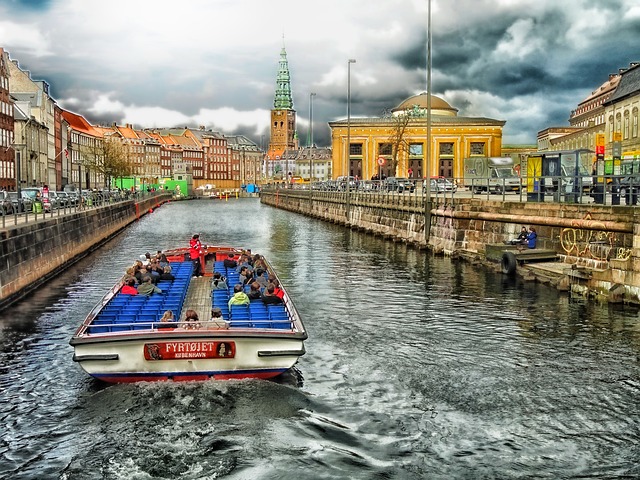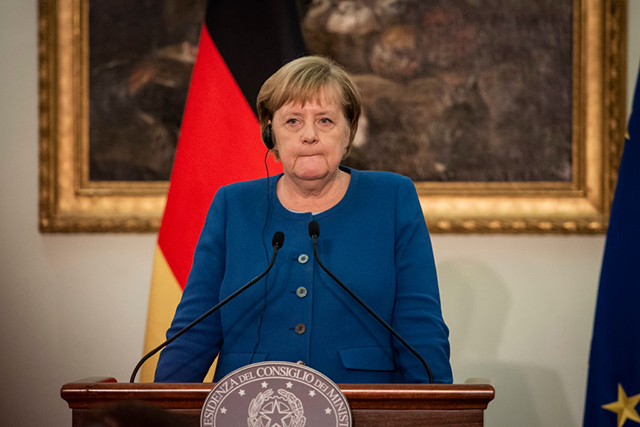The Nord Stream project is a gathering of former Kremlin spies from all over Europe and their supporters. It is an instrument of political influence and a source of enrichment for Russian President Vladimir Putin and his entourage. Still, it was forced to yield to Germany, the largest lobbyist of Russian interests in the EU. In order to continue its business as usual with the Kremlin, Germany and some EU countries are even ready to turn a blind eye to the possibility of a full-scale war in Ukraine. Jens Høvsgaard, Danish journalist and author of the "Spies Who Came with the Warmth" book, told Apostrophe about this and many other things.
- You investigated corruption in the Nord Stream 1 project. Tell us more about the corruption links between European elites and the Kremlin, and are they visible in Nord Stream 2?
- Two years ago I published a book about Nord Stream 1 in Denmark, but now I have written a new one about the whole process of building Nord Stream and published it in Germany. I researched Gazprom's methods, the project's links to crime, the political establishment - especially in Germany and Austria - and that I discovered that neither Gazprom nor Nord Stream are regular companies. Their mission is not to make a profit. Their mission is to work as a way for the Kremlin to influence neighboring countries, such as Ukraine and the EU, and to enrich contractors who are friends of President Vladimir Putin. I am not the only one who has come to the conclusion that this is a corrupt gas pipeline.
For example, last year the Russian Sberbank published a report that undermines the idea of the profitability of Nord Stream and other Gazprom projects. They analyzed the Power of Siberia (the future gas pipeline in Eastern Siberia to transport natural gas from the Republic of Sakha (Yakutia) to the Primorsky Krai and the Far East - Apostrophe), Turkish Stream and Nord Stream-2 and concluded that they are all unprofitable and generate profits only for contractors, companies headed by Arkady Rotenberg and Gennady Timchenko. Both are close friends of Putin, and both are under sanctions because of the illegal annexation of Crimea.
After the publication of this report, one of the authors, Alexander Fak, lost his job and the report itself disappeared from the bank's website. One of the informed sources at the bank informed that Fek was fired on Putin's personal instructions. I don't think it's just a coincidence.
Recently, my book "Greed, Gas and Money" was published in Germany, which shows Putin's close ties with Nord Stream and Gazprom's business. In 2001, Putin fired all of Gazprom's management and replaced it with Alexei Miller, his assistant in St. Petersburg in the 1990s. Later, more of Putin's intelligence colleagues - the KGB and FSB - were appointed directors of the company. Unlike any other energy company in the world, most of Gazprom's executives are old KGB and FSB agents.
- Explain please the strange situation with Denmark: the country has long banned Russia from building the Nord Stream 2, but in the end it gave its permission.
- Yes, Denmark agreed because the country was in a very, very difficult situation. When Russia received permits for Nord Stream-1, Denmark was the first country to give permission. Then-Prime Minister Lars Lukke Rasmussen only took up his post. In 2002, the World Chechen Congress was held in Copenhagen, and Chechen exiled leader Akhmed Zakayev visited it. In Russia, they said that Zakayev was just a terrorist and called on the Danish police to arrest him and extradite him to Moscow. The Danish government refused to do so and all ties between Russia and Denmark were severed. Denmark could no longer send pork and beer to Russia. Relations between the countries were as cold as winter weather in Siberia.
For Nord Stream 1, the permit concerned laying of pipes very close to the Danish coast, and the government could refuse it. The formal reason was that according to international law, gas pipelines should be laid in international waters in order to be environmentally friendly. But the new Danish prime minister saw an opportunity to establish business with Russia. At the time, it was treason.
But since Russia asked for permission for Nord Stream 2, a lot has changed. Denmark, most European countries and the United States see Putin as a new partner they can trust. But experience shows that this is not the case - first it was Georgia, then the annexation of Crimea and Donbas, then the intervention in Syria, the cessation of gas supplies to Ukraine.
In Denmark, we came to the conclusion that Nord Stream is not a regular gas pipeline. It is a political tool in Putin's hands, and if we can stop it or at least delay its launch, we must do so. And the Danish government has decided to work as slowly as possible on granting permission. At first, Russia asked for a permit for a gas pipeline in Danish territorial waters and was refused. Then it proposed two new routes, one on the north of the island of Bornholm and the other one on the south of it. We could give up both, demanding more research on environmental damage. This could take a very long time - we already held the project for two years, but once we had to give permission.
- How did society and political elites in Denmark react to Nord Stream 2? Was there any public discussion at all?
- There were almost no public discussions when issuing permission for Nord Stream 1. The government decided to do everything almost secretly. In the case of Nord Stream 2, everything was quite different. There were a lot of public discussions "for" and "against". Almost all political parties in Denmark were against the new gas pipeline. Only the right Danish People's Party, which is a fan of Putin and Russia, was for.
But I will explain once again that Denmark was between superpowers. The small country could not continue to resist. We could turn to the EU, because it is a more powerful force than Denmark. But the European Union would not oppose Nord Stream 2 because of Germany's role in the EU.
There was a time when France and Emanuel Macron practically abandoned Nord Stream 2. But Angela Merkel and German President Frank-Walter Steinmeier convinced Paris to change its attitude. Germany is the best lobbyist for Russian projects.
- Why? Is Germany so corrupted with Russia?
- Because of the money. German business is very closely connected with Russian business. First of all, they are natural gas consumers. Not long ago, Germany decided to shut down its nuclear power plants and concentrate on the energy produced from natural gas. Therefore, large German corporations need natural gas very much and it should be as cheap as possible. Putin and Gazprom are aware of this. This is why Poland, or the Netherlands, are paying more than Germany. And the German government will not be able to run the country without relying on the major German companies.
- You have quite rightly noted that Russia is not a reliable gas supplier. So, do you think Europe has a contingency plan if the Kremlin refuses to supply gas?
- Denmark does not buy a lot of gas in Russia, and we do not depend on it. But Germany depends on Russian gas. And so does the Netherlands. The Dutch buy a lot of gas. Poland, Ukraine, and neighboring countries do too, of course. But now the EU has issued a new directive on natural gas to control Putin and Gazprom so that Russia does not transit gas bypassing Ukraine. This is a way to prevent Russia's excessive interference in European infrastructure and a way to prevent the consequences of a possible gas shutdown.
- Russia is already dismantling the gas pipeline to Ukraine on its territory, so we will not be able to supply Europe with purely physical gas. On the other hand, gas expert Mykhailo Korchemkin said that if transit through Ukraine stops, Russia may start a full-scale war. In your opinion, is this a realistic scenario?
- I think this is, unfortunately, a very realistic scenario. I see that some European countries, when giving permission to Gazprom, know about these opportunities. Germany continues to argue that it will not agree to disconnect Ukraine from transit, but it will do so even though there is a possibility of a full-scale war.
- Does this mean that the Western world is ready to turn a blind eye and not see military actions, violations of international law, just to continue business as usual with Russia?
I think we should be very scared of what is happening now. We should be scared of the power that Putin has now. He is very active in the Middle East - in Syria, in Libya. He now claims the role of a world leader. He has always had ambitions to restore Russia as a super-state. And now "a clown in the White House" and what he does allows Putin to do everything he wants. Putin is becoming a very important international factor. I think the international community should take care of what is happening in Russia. It should support Ukraine. I think Ukraine should be a member of NATO and the EU. It would be very important for the country, but I think Putin will not allow it.
- Is there any way to stop Putin? Or will we have to wait until he dies or transfers power to someone else?
- Now I see no alternative to Putin in Russia. He is very strong, he controls everything, including the elections. If he decides to leave the presidency, he will do so. But there is no one who can stop him now. The opposition in Russia is not strong enough. If it is possible to stop Putin, it is only through international efforts by Europe and the EU, imposing more sanctions on him and his friends. People, who are close to Putin are interested only in self-enrichment. Putin is probably one of the richest people in the world, and a more detailed study of his condition will show the world and, more importantly, the Russians what kind of person he is. It is very important to inform Russians because most of them are actually delighted with Putin. And they think that Putin is doing the right thing, restoring Russia as a super-state.




